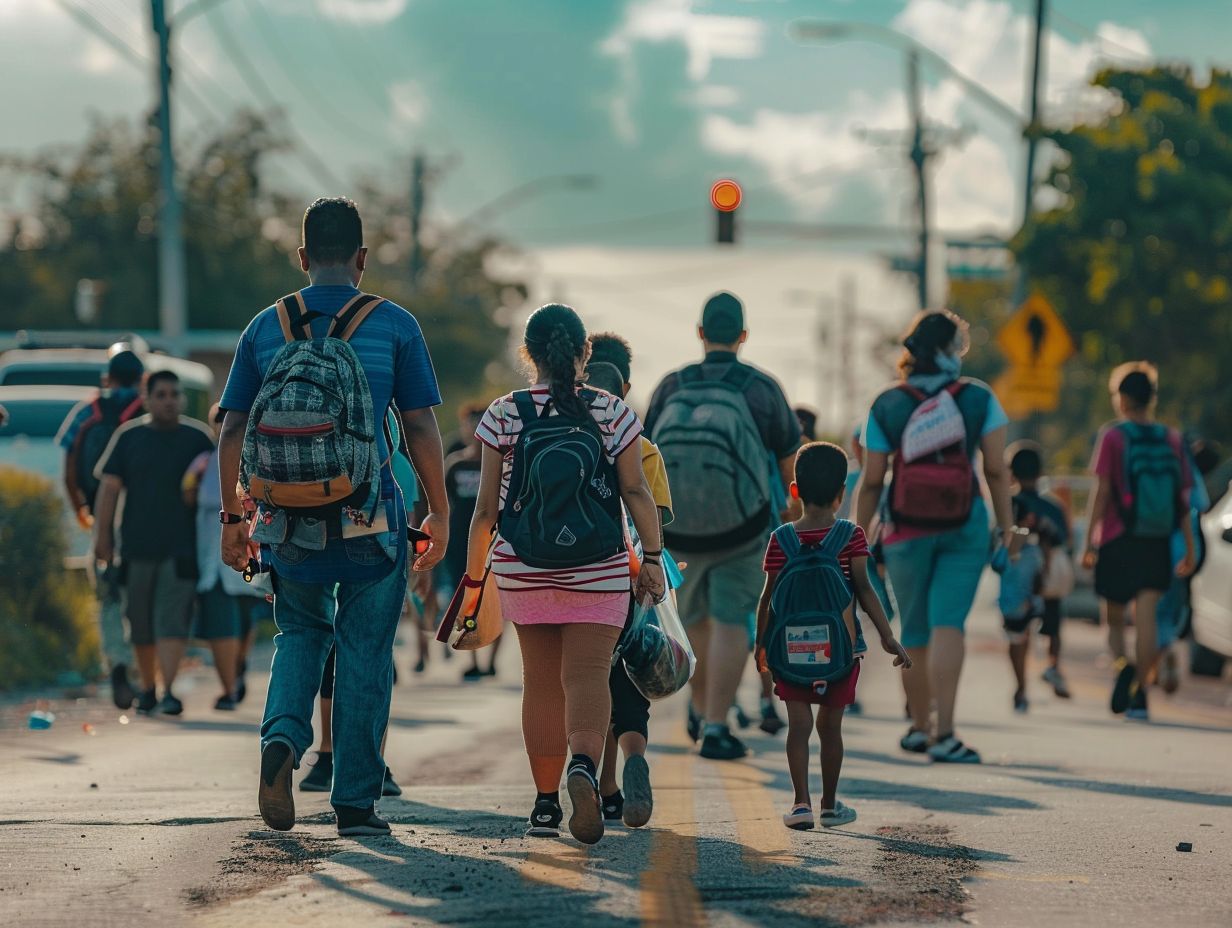DACA, or Deferred Action for Childhood Arrivals, has been a hotly debated topic in recent years, especially in Florida where a significant number of immigrants benefit from the program.
This article explores the requirements for DACA, the benefits it provides to Florida immigrants such as access to education and protection from deportation, as well as the challenges they face, including the lack of permanent legal status and uncertainty about the program’s future.
We delve into how DACA has impacted Florida’s economy, through contributions to taxes, consumer spending, and job creation.
We also discuss alternatives to DACA for Florida immigrants, such as seeking asylum or advocating for immigration reform. Learn more about this important issue affecting the Sunshine State.
Key Takeaways:

- DACA has provided opportunities for education, employment, and protection from deportation to over 32,000 immigrants in Florida.
- Despite facing challenges such as uncertainty about the program’s future and limited access to federal benefits, DACA recipients have made significant contributions to Florida’s economy through taxes, spending, and job creation.
- As alternatives to DACA, immigrants in Florida can explore applying for asylum or seeking a path to legal permanent residency, while also advocating for immigration reform.
What is DACA?
The Deferred Action for Childhood Arrivals (DACA) is a federal program established in 2012. It enables undocumented individuals who were brought to the United States as children to receive a renewable two-year period of deferred action from deportation. Additionally, they become eligible for a work permit. This program has a significant impact on Florida’s immigrant communities.
What are the Requirements for DACA?
For qualify for DACA, applicants must meet specific requirements, which include arriving in the U.S. before their 16th birthday and maintaining continuous residence since June 15, 2007.
Individuals seeking DACA must be under the age of 31 as of June 15, 2012. They must also be currently enrolled in school, have graduated from high school, obtained a GED, or been honorably discharged from the U.S. Armed Forces. DACA recipients are individuals who fulfill these criteria and are considered to have a lawful immigration status in the U.S., enabling them to work and study without the fear of deportation.
How Many People are Affected by DACA in Florida?
The Migration Policy Institute reports that a notable number of Florida residents are DACA recipients, constituting a significant demographic affected by this program. The presence of DACA recipients in Florida has garnered considerable attention, with data indicating that around 29,000 active DACA beneficiaries were in the state as of March 2021.
These young immigrants have made cultural contributions to Florida and also fulfill essential roles in diverse economic sectors. Their education, employment, and general welfare have a substantial influence on communities throughout the state, underscoring the importance of DACA in Florida’s socio-economic framework.
What are the Benefits of DACA for Florida Immigrants?
DACA provides various benefits for immigrants in Florida, such as access to education, employment opportunities, and protection from deportation, which can significantly enhance their quality of life.
Access to Education and Employment Opportunities
DACA provides recipients with expanded access to education and employment opportunities, allowing them to pursue higher education and secure improved job prospects.
This increased educational access enables DACA beneficiaries to enroll in colleges and universities, give the power toing them to acquire specialized skills and knowledge that are essential for success in today’s competitive job market.
By completing their education and obtaining advanced degrees, DACA recipients can enhance their career opportunities, leading to increased earning potential and greater job stability.
The ability to legally work in the United States under DACA offers a wide range of employment options, allowing individuals to make positive contributions to the workforce and society overall.
Protection from Deportation
One of the key benefits of DACA is that it offers protection from deportation, allowing recipients to live without the constant fear of being removed from the country. This protection plays a crucial role in the daily lives of DACA recipients, providing them with a sense of stability and security.
Without the fear of sudden separation from their families and communities, they can focus on pursuing education, careers, and contributing positively to society.
The mental well-being of DACA recipients is significantly impacted by this safeguard, reducing stress and anxiety that often accompany the uncertainty of their immigration status. Being able to build a future without constant fear of being deported allows them to thrive and fully engage in the opportunities available to them.
Ability to Obtain a Driver’s License

In Florida, DACA recipients have the opportunity to apply for and receive driver’s licenses, which helps improve their ability to move around and access important services.
To apply for a driver’s license in Florida, DACA recipients must submit specific documentation to the Florida Highway Safety and Motor Vehicles department. This includes providing proof of identity, like a valid passport, proof of residency in Florida, and proof of either a Social Security Number or evidence of ineligibility for one.
They are also required to pass a written knowledge test and a driving skills test. Once they fulfill all the necessary requirements, DACA recipients can then get their driver’s license, which allows them to carry out daily tasks with more ease and independence.
Eligibility for In-State Tuition and Financial Aid
DACA recipients in Florida may be eligible for in-state tuition rates and financial aid, offering increased affordability and accessibility to higher education.
- To qualify for in-state tuition in Florida, DACA recipients must meet specific requirements, which include:
- Attending a Florida high school for a minimum of three years
- Graduating from a Florida high school, or obtaining a GED in the state
- Providing documentation demonstrating their lawful presence in the United States
By fulfilling these conditions, DACA recipients can take advantage of reduced tuition fees compared to out-of-state rates.
State-funded financial aid programs in Florida allow DACA recipients to access additional financial assistance to pursue their educational objectives.
What are the Challenges Faced by DACA Recipients in Florida?
Despite the advantages, DACA recipients in Florida encounter various challenges, such as the absence of permanent legal status, uncertainty regarding the program’s future, and restricted access to specific federal benefits.
Lack of Permanent Legal Status
One of the key challenges for DACA recipients is the absence of a path to permanent legal status, leaving them in a state of legal uncertainty. This lack of clarity can have significant implications for their future planning and stability.
Without the guarantee of permanent legal status, DACA recipients may encounter difficulties when making important decisions about their education, career, and personal life.
The absence of stability can impede their ability to commit to long-term objectives, like purchasing a home, starting a family, or pursuing advanced degrees. It can result in ongoing anxiety about their future and the worry of deportation, leading to considerable emotional and mental strain.
Uncertainty about Future of DACA Program
The future of the DACA program is uncertain due to ongoing political and legal challenges, leading to anxiety and instability for recipients. These challenges have resulted in recipients living in a constant state of concern, unsure if their protection from deportation will be maintained.
The back and forth in courts and announcements from the federal government have left DACA recipients in a state of limbo, unsure of their next steps. This uncertainty also impacts their ability to plan for the future, affecting their education, careers, and overall well-being.
As debates and legal battles persist, the emotional toll on DACA recipients remains significant, with the looming threat of losing their protected status ever present.
Limited Access to Certain Federal Benefits
DACA recipients have limited access to certain federal benefits, including programs in the healthcare industry, which can restrict their access to essential services. This restricted access presents significant challenges for DACA recipients seeking healthcare and social services, as they may not be eligible for Medicaid or Medicare coverage.
Without proper health insurance, accessing preventive care, medications, and necessary treatments can become financially burdensome. These individuals may encounter barriers in accessing mental health services, prenatal care, and other essential medical resources.
The healthcare industry, along with related entities such as community health centers and non-profit organizations, plays a crucial role in providing support to marginalized populations, underscoring the importance of addressing these disparities.
How has DACA Impacted Florida’s Economy?
DACA has had a significant impact on Florida’s economy by contributing to state and local taxes, increasing consumer spending, and fostering job creation and economic growth, as noted by the U.S. Chamber of Commerce.
Contributions to State and Local Taxes

DACA recipients make significant contributions to state and local taxes, providing a notable economic benefit to Florida’s economy. These individuals contribute taxes through various means, including income taxes, property taxes, and sales taxes. According to a study by the Institute on Taxation and Economic Policy, DACA recipients in Florida generated around $32 million in state and local taxes in 2019.
This tax revenue is essential for funding important public services like education, healthcare, and infrastructure development. The economic effects of these contributions reach beyond tax revenue, benefiting local businesses and fostering economic growth in communities throughout the state.
Increased Consumer Spending
DACA recipients in Florida have been noted to increase consumer spending, which in turn stimulates the economy and supports local businesses. Their contributions are not limited to retail sectors but also extend to restaurants, entertainment venues, and service providers.
By infusing money into the local economy, DACA recipients play a vital role in sustaining small businesses and generating job opportunities for others. The positive effects are not solely financial, as they also promote a sense of community well-being and inclusion. Through their active involvement in the local economy, these individuals contribute to driving growth and prosperity for the entire community.
Job Creation and Economic Growth
The DACA program has led to job creation and economic growth in Florida by allowing recipients to work legally and contribute to various industries. For example, DACA recipients are actively involved in healthcare, technology, and education sectors.
In healthcare, many DACA beneficiaries hold positions as nurses, medical assistants, and healthcare aides, offering essential services to the community.
Within the technology industry, they utilize their skills in software development, IT support, and data analysis, fostering innovation and productivity.
In the education sector, DACA recipients work as teachers, counselors, and administrators, enriching the learning environment for students throughout the state.
Their diverse talents and contributions have had a positive impact on these industries, promoting economic growth and generating job opportunities for themselves and others.
What are the Alternatives to DACA for Florida Immigrants?
Florida immigrants who are ineligible for DACA or seeking more permanent solutions have alternatives available. These options include applying for asylum, pursuing legal permanent residency, or advocating for comprehensive immigration reform.
Applying for Asylum or Other Forms of Relief
One option available to undocumented individuals in Florida is to consider applying for asylum or other types of relief, which can offer protection and legal status.
Applying for asylum typically involves demonstrating a credible fear of persecution based on factors such as race, religion, nationality, political beliefs, or affiliation with a specific social group. This application process is known for its complexity and difficulty, often necessitating comprehensive documentation and legal representation.
Alternatively, other forms of relief, like Temporary Protected Status (TPS) or Deferred Action for Childhood Arrivals (DACA), provide temporary safeguards against deportation and authorization to work. While these avenues can be vital for immigrants with uncertain futures, they also have their own distinct requirements and limitations that applicants must carefully manage.
Seeking a Path to Legal Permanent Residency
The pursuit of legal permanent residency is a viable option for some immigrants in Florida, providing a more stable and long-term solution.
Individuals aiming to secure legal permanent residency in Florida must satisfy specific eligibility requirements. This generally involves possessing a valid immigration status, a clear criminal record, and the financial means to sustain oneself.
The process of applying for permanent residency, often referred to as a Green Card, entails submitting various forms and supporting documents to the United States Citizenship and Immigration Services (USCIS). Adherence to all USCIS guidelines and deadlines is essential to facilitate the smooth processing of the application.
Advocating for Immigration Reform
Advocating for comprehensive immigration reform at the federal level is important for addressing the long-term needs of undocumented individuals in Florida.
This reform is significant in providing a pathway to legal status, access to essential services, and integration into society. Advocacy efforts aim to bring about sustainable solutions that uphold human rights and promote inclusivity by advocating for policy changes.
The federal government’s role in shaping immigration policies is crucial, but the support and engagement of local communities are also essential. Grassroots movements, community organizations, and local leaders often act as catalysts for change, amplifying voices and mobilizing support for reform initiatives.
Frequently Asked Questions

What is DACA and how does it impact Florida immigrants?
DACA stands for Deferred Action for Childhood Arrivals, a program introduced in 2012 that allows immigrants who came to the US as children to temporarily stay and work in the country. In Florida, DACA has provided opportunities for education and employment to thousands of young immigrants.
What are some statistics on the impact of DACA on Florida immigrants?
As of 2020, there are over 33,000 active DACA recipients in Florida, making up 6% of the national total. These individuals contribute to the state’s economy, paying over $50 million in state and local taxes each year.
How has DACA affected the education of Florida immigrants?
According to a study by the Migration Policy Institute, 46% of DACA recipients in Florida are currently enrolled in higher education, with 71% of them pursuing a bachelor’s degree or higher. This has opened up educational opportunities for many young immigrants who were previously limited by their undocumented status.
What are the economic benefits of DACA for Florida immigrants?
DACA recipients in Florida have been able to secure higher-paying jobs and contribute to the state’s economy. The same study by the Migration Policy Institute estimated that the state’s GDP could increase by $1.5 billion over a 10-year period due to the economic contributions of DACA recipients.
How has the political climate affected the impact of DACA on Florida immigrants?
The Trump administration’s attempts to end DACA in 2017 caused uncertainty and fear among Florida’s immigrant community. However, a 2020 Supreme Court ruling has allowed the program to continue, providing relief and stability for DACA recipients and their families in the state.
What are some challenges that DACA recipients in Florida still face?
Despite the benefits of DACA, recipients in Florida still face obstacles such as limited access to higher education, healthcare, and financial aid due to their immigration status. They also have to renew their DACA status every two years, which comes with its own set of financial and bureaucratic challenges.























Rate this article:
Average rating 0 / 5. Vote count: 0
No votes so far! Be the first to rate this post.
No Comments yet!